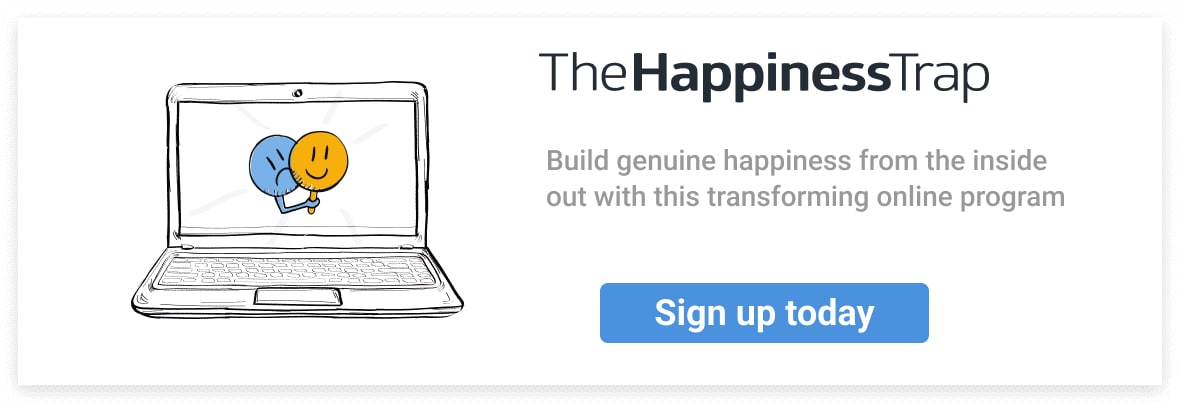It’s a lot easier to start some new type of life-enhancing behaviour than it is to keep it going.
How can we sustain new patterns of behaviour, until we’ve done them for so long they become habitual?
And for those of us who are therapists, coaches, or other types of health professionals: how can we help our clients to keep up new behaviour between sessions?
Well, there are hundreds, if not thousands of tools out there to help us with this challenge, but we can pretty much bundle them all into what I like to call ‘The Seven Rs’: Reminders, Records, Rewards, Routines, Relationships, Reflecting, and Restructuring.
Now let’s take a look at each one individually.
1) Reminders
We can create all sorts of simple tools to help remind us of the new behaviour we wish to persist with.
For example, we might create a pop-up or a screen saver on our computer or mobile phone with an important word or phrase or symbol that reminds us to act mindfully or to utilise a particular value.
We might use the old favourite of writing a message on a post-it and sticking it on the fridge or propping it against the bathroom mirror or taping it to the car dashboard. Or we might write something in a diary or calendar or in the ‘notes’ app of a smartphone.
We might write just one word, like ‘breathe’ or ‘pause’ or ‘patience’, or we might use an acronym like ‘A.C.T’ or ‘S.T.O.P’, or a phrase like ‘letting go’ or ‘caring and compassionate’.
Alternatively we might put a brightly-coloured sticker on the strap of our wristwatch or the back of our smartphone or the keyboard of our computer, so that every time we use these devices, the sticker reminds us to do the new behaviour.
2) Records
We can keep a record of our behaviour throughout the day, noting down when and where we do the new behaviour, what the benefits are, when and where we do the old behaviour, and what the costs are.
Any diary or notebook – on paper, or on a computer screen – can serve this purpose.
3) Rewards
When we do some form of new behaviour that involves mindfully acting on our values, hopefully that will be rewarding in its own right. However, we can help to reinforce the new behaviour with additional rewards.
One form of reward is kind, encouraging self-talk, e.g. saying to yourself: ‘Well done. You did it!’ Another form of reward is sharing your success and progress with a loved one who you know will respond positively.
On the other hand, you might prefer more material rewards. For example, if you sustain this new behaviour for a whole week, you buy or do something that you really like – get a massage, for example.
4) Routines
If you get up every morning at the same time to meditate or exercise or do yoga, over time that regular routine will become habitual.
It will require less ‘willpower’ and it will become a part of your regular routine. So experiment: see if you can find some way to build a regular routine or ritual around your new behaviour, so it starts to become part of your way of life.
For example, if you drive home from work, then every night, just before you get out of your car, you might do two minutes of mindful breathing, and reflect on what values you want to live by when you walk through the front door into your home.
5) Relationships
It’s easier to study if you have a ‘study-buddy’, it’s easier to exercise if you have an ‘exercise-buddy’.
In AA programs, they team you up with a sponsor who is there to help you stay sober when the going gets tough. So can you find a kind, caring, encouraging person who can help support you with your new behaviour?
Maybe you can check in with this person on a regular basis and tell them how well you are doing, as mentioned in ‘Rewards’. Or maybe you can email your support person the ‘Records’ you’ve been keeping.
Or maybe you can use the other person as a ‘Reminder’ – ask them to remind you to do the new behaviour, if and when that would be useful. For example, you might say to your partner,
“When you see me worrying, can you please remind me to do some mindful breathing?”
6) Reflecting
Regularly take time to reflect on how you are behaving, and what effect it is having on your life. You can do this via writing it down – ‘Records’ – or in discussion with another person – ‘Relationships’.
Or you can do this as a mental exercise throughout the day, or just before you go to bed, or just as you’re waking up in the morning.
You simply take a few moments to reflect on questions such as:
1) How am I going?
2) What am I doing that’s working?
3) What am I doing that’s not working?
4) What can I do more of, or less of, or differently?
Make sure you also reflect on the times that you STOP doing the new behaviour, and fall back into the old one.
Notice what triggers those relapses and setbacks, and notice what it costs you – i.e. how do you suffer when that happens?
This doesn’t mean beat yourself up! This means non-judgmentally reflecting on the genuine costs to your health and wellbeing caused by falling back into old habits.
Then use your awareness of the suffering this causes you, to help motivate yourself to get back on track.
7) Restructuring
We can often restructure our environment to make our new behaviour easier, and therefore more sustainable.
For example, if the new behaviour is ‘healthy eating’ we can restructure the kitchen to make healthy eating easier.
We can get rid of, or hide away, the junk food, and stock the fridge and pantry with healthy stuff.
If we want to go to the gym in the morning, we could pack up our sports-gear in our gym-bag, and place it by the side of the bed or somewhere else obvious and convenient, so it’s all ready to go as soon as we get up.
So there you have it – ‘The Seven Rs’: Reminders, Records, Rewards, Routines, Relationships, Reflection, and Restructuring.
Now be creative! Mix and match these methods to your heart’s content to create your own set of tools for lasting change. Good luck with it!




